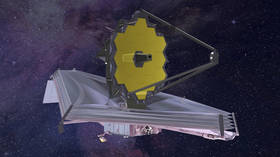Largest space telescope sustains ‘uncorrectable’ damage

The largest optical telescope in space sustained permanent damage when it was struck by a meteoroid in May, an investigation has revealed.
A tiny meteoroid struck the James Webb Space Telescope (JWST) between May 22 and May 24. According to a performance report issued by NASA, the European Space Agency and the Canadian Space Agency last week, the collision “caused uncorrectable change in the overall figure” of the observatory’s C3 mirror segment.
“The effect was small at the full telescope level because only a small portion of the telescope area was affected.”
Although the telescope was designed to withstand such collisions, the report said the strike in May “exceeded prelaunch expectations of damage for a single micrometeoroid.”
At present, the largest source of uncertainty is long-term effects of micrometeoroid impacts that slowly degrade the primary mirror.
NASA said last month that, while damage analysis was ongoing, the telescope was “still performing at a level that exceeds all mission requirements despite a marginally detectable effect in the data.”
Launched in December, the JWST will replace the Hubble Space Telescope, which has been operating since 1990. The first image captured by the JWST, which has longer wavelength coverage than the Hubble, was unveiled last week.












